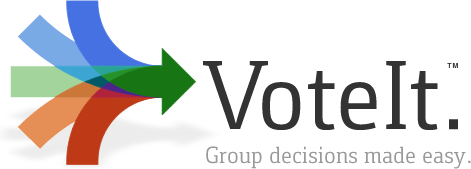VoteIt, a New Orleans-based startup focused on helping groups make decisions with realtime voting tools, announced today that it has raised $800,000 in seed funding from a group of local angels. And, in an example that should prove intriguing to those entrepreneurs looking to make Louisiana home base, VoteIt told us today that it is one of the many startups taking advantage of the state’s tax credit programs aimed at encouraging early-stage businesses (and their investors) to set up shop in Louisiana.
For example, there’s the Angel Investor tax credit, which provides state income or franchise tax credits of up to 35 percent for entrepreneurial businesses; as well as the Digital Media tax credit, which offers a tax credit of 25 percent on production expenditures for digital interactive productions in the state and 35 percent tax credit for payroll expenditures for Louisiana residents. Pretty cool.
We also recently wrote about Federated Sample, another NOLA-based startup that has just raised money from the local venture capital community.
Both of these companies are focused on making it easy for businesses to better test the pulse of their customers and larger populations in realtime. While Federated Sample brings efficiency to online sampling, VoteIt wants to help make group decision-making more efficient (and easier), enabling businesses to move past those collective moments of indecision, to action, by way of what the startup is calling a “realtime consensus generator”.
What does that mean? Well, for starters VoteIt is in private beta and isn’t planning on launching until early 2012, so the company itself is still in process of collecting feedback — and iterating. But, fundamentally, says VoteIt CEO Taylor Beery, collaborative decision making has struggled to scale, as group decision making has been represented online with the standard checkbox, snapshot opinion gathering, and convoluted comment threads. As a result, businesses have turned to email and email workflow tools to make group decisions, which is generally non-scalable, impersonal, and again provides little clarity.
Other solutions, the CEO said, have steered towards simplicity, sacrificing collaborating for scale based on the fear of overloading the user. To address this, VoteIt wants to take the collaborative potential of a three-person group and give it scale, providing the ability to make decisions and receive feedback from the group in realtime — from any device.
While VoteIt is still holding back a bit on its features, Beery said that they’re going after a dynamic realtime engagement by creating a voting process that mimics a live, real world vote, allowing for debate, presentation of evidence, and consensus building. This will be implemented through a simple user interface that is cross-platform and device agnostic and also allows users to take comments out of the comment stream to organize and categorize them inline, he says.
VoteIt wants to create a reward system as well and transparency so that polling is done in an organized, accountable way.
As to use case, Beery sees the inefficiencies in both the patient-healthcare provider relationship as well as intercommunication between providers as prime targets for disruption by VoteIt’s system. Doctors continue to use chat rooms to consult groups of other physicians in different locations on group decisions, as well as email, which slows down the collaboration process. Using the VoteIt system, he says, doctors would be able to access a clear consult from the Web or their mobile devices based on collaborative debate and presentation of evidence — medical records, videos, and so on. (See what Avado is doing for the physician-patient relationship as well, the Salesforce for personal health records startup is attacking a similar pain point.)
Governance, too, whether it be non-profits or community groups, are largely dependent on large in-person meetings or reply-all email chains to make decisions and pass (oftentimes) simple resolutions. VoteIt wants to provide these kinds of users with a simple, scalable collaboration platform to build consensus and make decision making more efficient.
Allowing the entire process of creating a vote, voting, and viewing results to take place on the group’s website or mobile devices lets users easily keep up with a group’s progress from any location. It will be interesting to see how this is implemented, whether it’s through a white-label, customized solution for individual businesses, or a one-size-fits-all dashboard and hosted platform, accompanied by widgets and so forth.
VoteIt is certainly tackling a big problem, but it remains to be seen whether real collaboration between large entities can happen in a web-based platform, especially one that starts with online voting. Real debate, back-and-forths, etc., can be tough to streamline and present in digital solutions. There are lots of platforms and solutions trying to make CRM and feedback workflows more manageable and easier to deal with for SMBs. I think VoteIt is onto something here, but the proof is in the pudding, as they say. Stay tuned for more.
Either way, again, it’s nice to see the New Orleans tech community tackling big problems, as well as the state of Louisiana creating tax incentives and making other institutional changes to encourage innovation and bring startups into its borders.
And on that note, we’ve also come across an interesting new initiative called NOLABound, which is attempting to promote progress in New Orleans (within digital media, biosciences, sustainable industries, and arts-based businesses) by inviting 25 professionals — chosen through a competitive application process — to the city. The program will give the chosen applicants complete access to businesses, influencers, and other professionals in exchange for tweeting their thoughts about the city and its business ecosystem.
The idea is to build momentum within these industries in New Orleans as well as broadcast to the rest of the country what’s going on within the city — and use the impressions of the 25 applicants as a way to see what other professionals and experts think. A unique form of scaled, crowdsourced feedback in and of itself.
For more on NOLABound, check out the program here, and for more on the early progress of VoteIt, go here. Video below.

